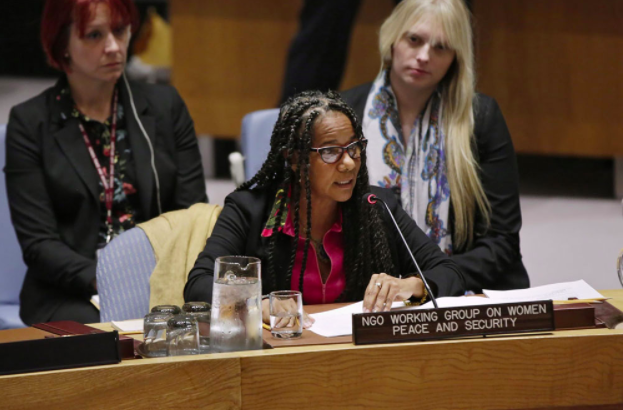Inside The UN Security Council: Year In Review
By Anne Lescure, United Nations Security Council Monitor Fellow
Charo Mina-Rojas, a member of the human rights team of the Black Communities’ Process, the Afro-Colombian Solidarity Network, the Black Alliance for Peace, and the Special High Level Body for Ethnic Peoples, addresses the Security Council’s open debate on Women, Peace and Security (Photo: NGO Working Group on WPS).
In 2017, the implementation of the Women, Peace and Security (WPS) Agenda demonstrated strong accomplishments, as well as ongoing challenges. The Council added a gender perspective into the mandate of United Nations Support Mission for Libya (UNSMIL), provided some space for women-led civil society and women peace activists in its work and renewed its commitment to conflict prevention. At the same time, effective action across the conflict cycle was limited due to the budgetary cuts to gender functions in UN peacekeeping missions, Permanent Members’ ongoing political use of their veto and increased focus on women’s participation in the military and defense industry.
To strengthen accountability for holistic action, in 2017 WILPF monitored and analysed 19 open debates, over 55 resolutions and nearly 40 reports submitted by the UN Secretary-General to the Council. We also updated the WPS Commitments database, which observed October 2015 WPS commitments up to 2017, and launched the Security Council WPS Scorecard research brief to highlight the main gaps in the WPS implementation efforts, including gender power analysis, disarmament and financing.
Our strategic and transparent monitoring showed the need for the Council to shift priorities away from its current militarised vision towards gendered conflict prevention and feminist peace, through consistent gender power analysis, women’s meaningful participation, comprehensive services and access to justice. This change would result in the Security Council listening and using information to better understand the root causes of conflict, the possibilities for change and the policies needed to achieve it. Human rights and peace activists would get support and protection. Military budgets would decrease. Women civil society would be valued and invested in.
Further action that builds on and strengthens Sweden’s “feminist foreign policy” is needed. Now is the time to find out how we can collectively advance the Feminist Agenda in the Security Council!
Find more information about WILPF’s Security Council Monitoring Work here>>
Find WILPF’s analysis of the Arria Formula Meeting entitled “Increasing the Participation of Women in Global Conflict Prevention and Mediation” here>>
Find more information about the United Nations Security Council open debate on Women, Peace and Security here>>
Find more information about the United Nations Security Council open debate on Sexual Violence in Conflict here>>
Find the Record of the Informal Expert Group meetings here>>
Find WILPF’s Security Council Scorecard on Women, Peace and Security here>

